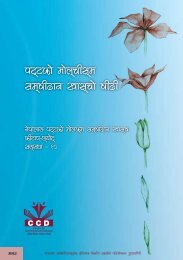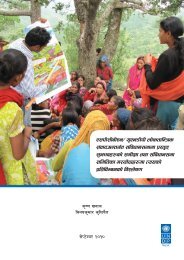The Dalits of Nepal and a New Constitution - ConstitutionNet
The Dalits of Nepal and a New Constitution - ConstitutionNet
The Dalits of Nepal and a New Constitution - ConstitutionNet
Create successful ePaper yourself
Turn your PDF publications into a flip-book with our unique Google optimized e-Paper software.
42<br />
<strong>The</strong> <strong>Dalits</strong> <strong>of</strong> <strong>Nepal</strong> <strong>and</strong><br />
a <strong>New</strong> <strong>Constitution</strong><br />
Members must read about constitutions, <strong>and</strong> about the<br />
issues. <strong>The</strong>y must take an active interest in the<br />
opportunities that will certainly be presented to learn<br />
about the work <strong>of</strong> the Constituent Assembly. <strong>The</strong>y must<br />
learn to speak in public. <strong>The</strong>y must familiarise themselves<br />
with the material provided by various bodies that are<br />
relevant to their concerns. <strong>The</strong>y will have a particular<br />
responsibility to learn about the issues that relate to the<br />
subject committee on which they serve. In relation to<br />
the issues on which they <strong>and</strong> their community have a<br />
particular interest they must underst<strong>and</strong> not just what<br />
the proposal are <strong>and</strong> what the arguments in favour are,<br />
but they must learn what the arguments against are<br />
going to be. And they must be able to decide whether<br />
those arguments against have any validity – <strong>and</strong> if so be<br />
prepared to think again, <strong>and</strong> if not be able to counter<br />
those arguments. And they must be prepared to listen –<br />
because those who do not listen will never underst<strong>and</strong><br />
what is going on, <strong>and</strong> what arguments are being made<br />
on the other side.<br />
A particularly difficult issue for members will be the<br />
possible tension between their responsibility to party<br />
<strong>and</strong> their responsibility to their own community <strong>and</strong> other<br />
causes. It would very <strong>of</strong>ten be best to try to persuade<br />
their own party that a particular provision that the Dalit<br />
community wants (or the Janajatis etc., depending on<br />
their own group), or that a particular region wants, is<br />
something the party should adopt as a policy. But what<br />
happens if the party simply refuses to accept this position?<br />
<strong>The</strong>re is a risk that a party might try to discipline a member<br />
who did not toe the party line. And a person who is<br />
dismissed from their party would, it seems from the<br />
Interim <strong>Constitution</strong>, lose his or her seat. But hopefully<br />
the parties will realise that every member has more than<br />
one identity. Members will not just be party members:<br />
they will be men or women, <strong>Dalits</strong>, Janajatis, persons<br />
with disability, Muslims, Buddhists, environmentalists,<br />
pr<strong>of</strong>essionals, farmers etc. <strong>and</strong> they will all have views<br />
on what the interests <strong>of</strong> these various communities<br />
require. Dalit or Janajati or women members etc will<br />
need to work not just within their parties but in alliance<br />
across party lines. Parties should accept that this may be<br />
in the interest <strong>of</strong> the nation as a whole, <strong>and</strong> not treat it<br />
as simply disloyalty. And – parties will not be able to<br />
dismiss all <strong>Dalits</strong>, Janajatis, women <strong>and</strong> Madhesis if they<br />
choose to caucus across party lines!<br />
Can a <strong>Constitution</strong> be<br />
“self-executing”?<br />
Anyone who reads the 1990 <strong>and</strong> Interim <strong>Constitution</strong>s<br />
thoughtfully may conclude that constitutions are<br />
ineffective weapons – for there are in fact a good number<br />
<strong>of</strong> fine sounding provisions about rights, including for<br />
<strong>Dalits</strong>, even in the 1990 <strong>Constitution</strong> (though it does<br />
not use the word “Dalit” specifically (see Appendix 3).<br />
If the 1990 <strong>Constitution</strong> had been fully implemented,<br />
would the condition <strong>of</strong> <strong>Dalits</strong> have still been so bad?<br />
Even when there is the possibility <strong>of</strong> going to court, the<br />
results may be disappointing. As commented in<br />
Appendix 4, implementation <strong>of</strong> Supreme Court decisions<br />
about human rights is weak. <strong>The</strong>re is especially no<br />
effective enforcement mechanism for orders to pass laws.<br />
Indeed it is not easy to devise an effective binding<br />
mechanism. <strong>The</strong> real power courts have to enforce their<br />
orders on constitutional matters is to hold individual liable<br />
for contempt <strong>of</strong> court – for which it is possible to send a<br />
person to prison. In order to do, this some person must<br />
have been ordered to carry out something which they<br />
had the capacity to do <strong>and</strong> failed to do. When “the<br />
government” is ordered to pass law, who has to act?<br />
What exactly do they have to do? How can government<br />
be ordered to make a law when that is the responsibility<br />
<strong>of</strong> the legislature? Other problems about relying on courts<br />
is that they only have the capacity to deal with a small<br />
number <strong>of</strong> cases. And they are not quick.<br />
So legal action has its values, but is no substitute for<br />
political action. Political pressure may be necessary to<br />
ensure that even court decisions are carried out.<br />
But there are some possibilities for drafting a constitution<br />
with more in-built mechanisms to ensure that it is<br />
implemented. <strong>The</strong> expression “according to law” should<br />
be viewed with the greatest scepticism: its effect is usually<br />
to make rights dependent on laws that may never be<br />
passed. As far as possible, courts should be able to<br />
enforce important rights without waiting for new laws.<br />
A <strong>Constitution</strong> might even give the courts power to draft<br />
directives with the force <strong>of</strong> law – if within a reasonable<br />
time government does not do so. <strong>The</strong> <strong>Constitution</strong> might<br />
create special mechanisms such as an independent<br />
commission for a period <strong>of</strong> perhaps 5 years to monitor


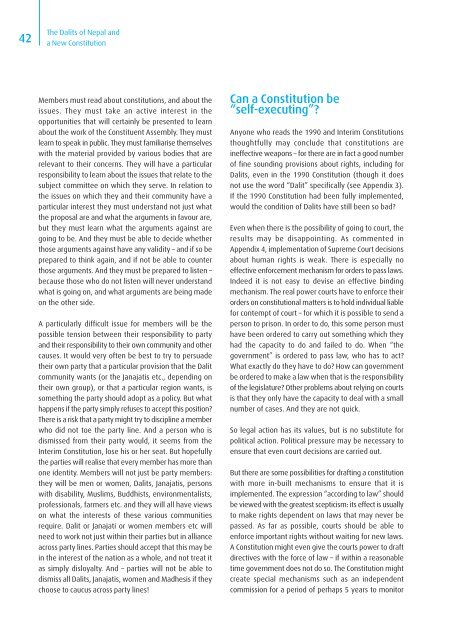

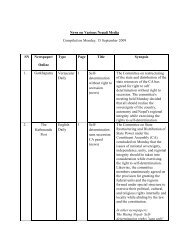

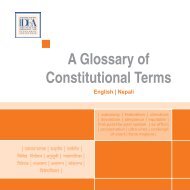
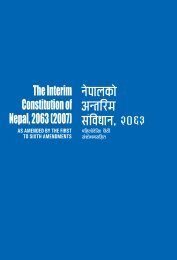
![g]k fnsf blntx? / gofF ;+l jwfg](https://img.yumpu.com/49483602/1/184x260/gk-fnsf-blntx-goff-l-jwfg.jpg?quality=85)
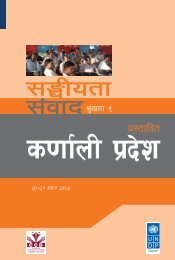

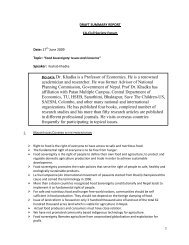
![+ljwfg;ef, /fHosf]k'g](https://img.yumpu.com/41604075/1/184x260/-ljwfgef-fhosfkg.jpg?quality=85)
